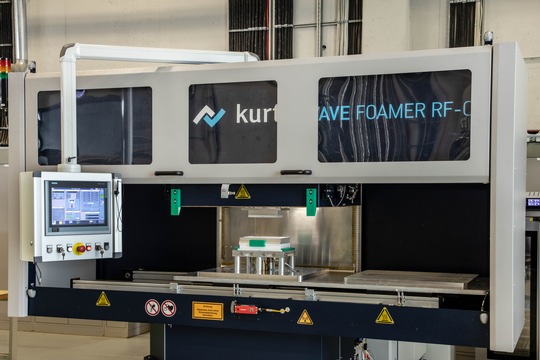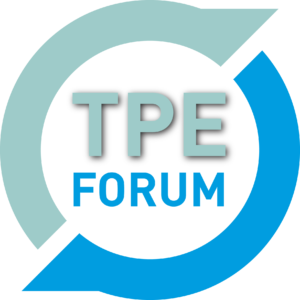Foams produced by moulding are used for example in packaging for electrical appliances, bicycle and motorcycle helmets, armrests in cars and many other applications. In the production process, foamed plastic beads are sintered using steam in order to form components. The choice of materials is therefore limited to those that can be joined within the temperature and pressure range of classic steam molding processes (between 1-8 bar), for example polystyrene (PS), polypropylene (PP) or thermoplastic polyurethane (TPU).
A new technology uses radio frequency instead of steam to sinter the foam beads. This significantly increases the range of applications, as materials with melting points of more than 240 °C can be used. One such processing unit is now available at Fraunhofer ICT, and is extending the institute’s research in the field of foaming technologies. The new technology offers the possibility of sintering thermoplastic foam particles to components using radio frequency rather than steam. The radio waves are introduced directly into the material. According to Fraunhofer ICT this leads to a high energy efficiency compared to the conventional processing of particle foams. It will open up new applications for insulation materials in construction, and for materials that meet demanding packaging requirements, as well as new foams in the mobility sector.

Fraunhofer ICT’s researchers have gained initial experience in the characterisation and analysis of polymers with regard to their suitability for radio frequency processing. A variety of materials have already been sintered into moulded parts using the new radio frequency moulding machine. Both commercial materials and the institute’s own formulations based on PLA, TPU, PET and other thermoplastics have been successfully produced on a pilot scale. „Classic“ materials, such as those based on PS and PP, have also been produced. The steam-free, energy-efficient process for particle foam production is also particularly suitable for the processing of high-temperature thermoplastics, and thus opens up a broader application field for particle foams. It also offers new possibilities for processing moisture-sensitive materials and hybridisation with non-foamed materials.
The new production unit is already being used for initial development projects and is also available, together with the institute’s expertise, for industrial customers.
About Fraunhofer ICT
Applied research on technical polymers for practical application is a core competence of the Polymer Engineering Department at Fraunhofer ICT in Pfinztal, Germany. Close thematic networking within Fraunhofer alliances, good international contacts and a collaboration with the Karlsruhe Institute of Technology KIT enables the institute to offer its partners system solutions from a single source: from polymer synthesis through to material technology, plastics processing, component development and manufacture, and recycling. The aim is holistic material and process development for robust, automated and flexible technologies in the context of increasing digitalisation and the demand for resource-saving material efficiency. The research group for foaming technologies works on material development for thermoplastic particle and extrusion foams. The entire process chain – from the raw material to the finished component – is the focus of research.
Particle foams tailored to the target application can be developed either by autoclave technology (up to 15 l) or particle foam extrusion (twin-screw extruders with underwater pelletis-ing, throughput 5-40 kg/h) and processed into components using pre-expanders and molding machines (based either on steam or radio frequency). In addition, a tandem extrusion line is available for the development and production of continuously foamed products/semi-finished products such as foamed sheets or films.
